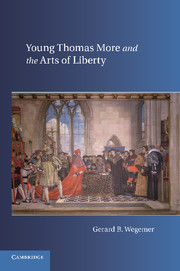Book contents
- Frontmatter
- Contents
- List of Illustrations
- Acknowledgments
- List of Abbreviations
- 1 Young Thomas More
- 2 Fashioning Peace and Prosperity
- 3 Cicero's and More's First Citizens
- 4 More's Earliest Views of Humanitas, Libertas, and Respublica, 1500–1506
- 5 More's Life of Pico della Mirandola (c. 1504–1507)
- 6 More's 1509 Coronation Ode
- 7 Political Poems of 1509–1516
- 8 Richard III
- 9 Utopia
- 10 The Un-Utopian Thomas More Family Portrait
- 11 The Arts of Liberty
- Works Cited
- Index
5 - More's Life of Pico della Mirandola (c. 1504–1507)
A Model of Libertas and Humanitas?
Published online by Cambridge University Press: 25 October 2011
- Frontmatter
- Contents
- List of Illustrations
- Acknowledgments
- List of Abbreviations
- 1 Young Thomas More
- 2 Fashioning Peace and Prosperity
- 3 Cicero's and More's First Citizens
- 4 More's Earliest Views of Humanitas, Libertas, and Respublica, 1500–1506
- 5 More's Life of Pico della Mirandola (c. 1504–1507)
- 6 More's 1509 Coronation Ode
- 7 Political Poems of 1509–1516
- 8 Richard III
- 9 Utopia
- 10 The Un-Utopian Thomas More Family Portrait
- 11 The Arts of Liberty
- Works Cited
- Index
Summary
Liberty above all things he loved, to which both his own natural affection and the study of philosophy inclined him; and for that he was always wandering and flitting and would never take himself to any certain dwelling. …
[Pico] to the end that, all the charge and business of rule or lordship set aside, he might lead his life in rest and peace, … all his patrimony and dominions … he sold.
Thomas More, Life of PicoWell aware of the enticements of philosophic pleasure and the difficulties of achieving that “true virtue” of the princeps, Cicero gave his son the following advice in his last philosophic work, the work that More would later echo “almost word for word.”
[M]y dear Cicero, while the whole field of philosophy is fertile and productive …, still no part is richer or more fruitful than that which deals with moral duties; for from these are derived the rules for living a consistent and good life.
(De Officiis 3.5)Because his son was studying then in Athens with the best philosophers of the time “to purchase, as it were, … a store of bonarum artium,” Cicero warns him that the intense effort involved may well be “work rather than pleasure,” but that he had a “heavy responsibility” to succeed in doing so (6). When More translates the reference to this passage in the Life of Pico, he eliminates Cicero's name and substitutes “doctrine” for “good arts” (bonarum artium), and although he translates studia humanitatis as “studies of humanity,” More indicates in this early work that Pico's idea of humanitas is far different from Cicero's and his own.
- Type
- Chapter
- Information
- Young Thomas More and the Arts of Liberty , pp. 70 - 87Publisher: Cambridge University PressPrint publication year: 2011



